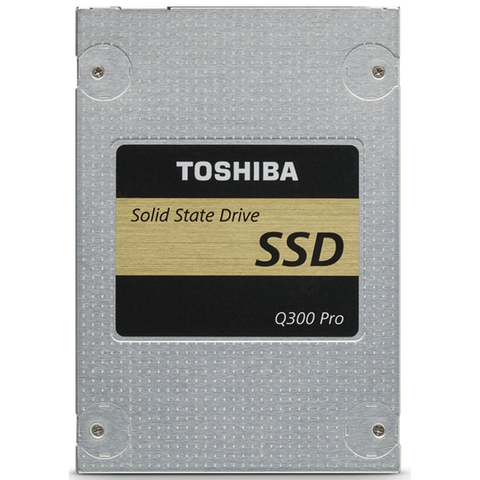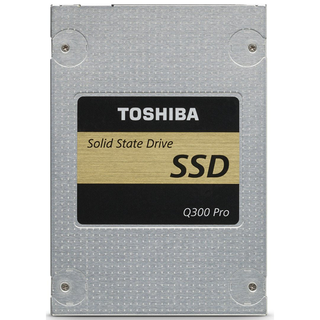Early Verdict
In this market, to sell products you need to either have the fastest SSD or offer the best value. No one wants to be the guy who spent too much and didn't get enough for it. The best SSD shouldn't have to wait for another model to enter end-of-life status to inherit a crown. Right now, Toshiba is just on the edge of delivering the best performance, but the price is too high for many to even give this model a chance.
Pros
- +
The Toshiba Q300 Pro delivers a high level of performance that we rarely see anymore in a world quickly being overrun by 3-bit-per-cell flash.
Cons
- -
For the cost, you just don't get enough value from the Q300 Pro. We would love to see what this drive can do with DRAM to buffer map data.
Why you can trust Tom's Hardware
Specifications, Pricing, Warranty And Accessories
Not long after last year's Flash Memory Summit, Toshiba released a pair of client-focused SSDs. The new Q300 and Q300 Pro follow a long line of underwhelming drives from a company that rarely warrants discussion due to misaligned pricing and poor marketing efforts. Today, we're focusing on the MLC-based Q300 Pro, but I want to touch on the TLC-based Q300 first to keep you up to speed with Toshiba's most recent efforts.
The Q300 appears to be a Toshiba-branded OCZ Trion 100 with the same Toshiba TC58NC1000 controller and Toshiba 128Gb 19nm TLC flash. That processor doesn't use Toshiba's Quad-Swing-By-Coding, an advanced form of ECC, so it's nearly identical to Phison's S10 controller. The Q300 is the only new Toshiba SSD to hit the 1TB mark before over-provisioning. And its price is higher than what you'd expect from an entry-level TLC-based SSD; the 480GB model currently sells for a wallet-busting $190 at Newegg.
The Q300 Pro follows the same design path as Toshiba's previous client-focused SSDs, the HG6 and Q-Series Pro. Like those other models, the Q300 Pro employs a DRAM-less design and odd dynamic SLC caching algorithm. It also struggles under lofty retail pricing.
Specifications
You'll find the Q300 Pro in three capacities: 128GB, 256GB and the 512GB model we're testing today. Toshiba utilizes the TC358790 controller it designed in-house. That's the same processor used on the Q300 Pro's predecessor, the HG6. In fact, aside from new firmware that increases sequential and random write performance, we don't see too many other differences between them. Again, they both come armed with Toshiba A19 NAND and lack DRAM buffers.
There is that significantly better sequential and random write performance, though. Toshiba doesn't specify performance for each capacity, instead covering the whole family with an up-to rating. We call these "hero numbers" because lower-capacity models can't achieve them. You'll see up to 550 MB/s sequential read and 520 MB/s sequential write speeds. Random 4KB performance is claimed at 92,000 IOPS for reads and 63,000 IOPS for writes.
Along with QSBC ECC, the Q300 Pro uses Toshiba's Adaptive SLC technology. This has been around for some time now, and is used in both Toshiba and OCZ products. The Adaptive SLC does a good job of accelerating performance, but also produces a few abnormalities during synthetic testing.
Pricing, Warranty And Accessories
The Q300 Pro is covered by a different warranty than the older HG6, too. Toshiba protects it with five-year coverage, two more years than the drive's predecessor. You also get a 7mm to 9.5mm adapter bracket and access to NTI's Echo software for cloning existing drives. Toshiba's marketing material says that an SSD Toolbox-like utility should have launched in December 2015, but we don't have any additional details.
At the time of writing, the 512GB Q300 Pro sold for $210; the 256GB model was priced at $130, and the 128GB model went for $80. When our sample arrives the 512GB sold for $60 more than it does now. The MSRP was well above the market average.
MORE: Best SSDs For The Money
MORE: Latest Storage News
MORE: Storage in the Forums
-
apache_lives When iI think Toshiba SSDs i think OCZ. OCZ is rubbish, do i trust this Toshiba product? NOReply -
stirrupchup Thanks for the review.Reply
I ended up skipping this drive and going for another one, and having read this review, I'm kinda glad I skipped it. Seems to be nothing special, and not worth the price. -
mortsmi7 "In this market, to sell products you need to either have the fastest SSD or offer the best value."Reply
I guess I'm the only one that prefers reliability over either of those factors, especially for a system drive. All SSD's fall under the fast category, that there is good enough for me. And as far quality is concerned, you get what you pay for to a certain extent. -
kalmquist The 256GB Q300 Pro is currently selling for $100, which is less than half the price of the 512GB unit reviewed here. That doesn't make any sense if both drives use the same controller and only differ in the abount of flash memory installed.Reply
-
3ogdy apache_lives. That was EXACTLY may thought. And yeah, yeah, yeah. "Enough with the FUD already...", but the stuff is there. The thing is, Toshiba actually deserves a chance. If problems arise, it's Toshiba's customer support you have to deal with, not OCZ. Moreover, this is a Toshiba product entirely, I believe, which should be at the other end of the spectrum when compared to utter crappy products from OCZ. People over at OCZ should look up "reliability" in a dictionary, ffs.Reply -
ssdpro +1 to OCZ being awful. I wouldn't trust Toshiba if they tolerate OCZ. I mean come on, their ARC 100 and Radeon drives had 0 day defects with ass-bottom reviews. Their Trion drives get 2 or 3 stars out of 5 at Amazon and Newegg. Ben from OCZ support responds to people with form responses that are ridiculous. Customer - "Drive died after 3 weeks, don't purchase" OCZ - "We value your purchase. Did you check the sata cable and update the firmware?" Come on guys, if there are a dozen reviews of dead drives stop responding with form spam and saying it is fixed with a firmware update. Firmware updates help replacements but don't mitigate the failure.Reply -
blazorthon Reply+1 to OCZ being awful. I wouldn't trust Toshiba if they tolerate OCZ. I mean come on, their ARC 100 and Radeon drives had 0 day defects with ass-bottom reviews. Their Trion drives get 2 or 3 stars out of 5 at Amazon and Newegg. Ben from OCZ support responds to people with form responses that are ridiculous. Customer - "Drive died after 3 weeks, don't purchase" OCZ - "We value your purchase. Did you check the sata cable and update the firmware?" Come on guys, if there are a dozen reviews of dead drives stop responding with form spam and saying it is fixed with a firmware update. Firmware updates help replacements but don't mitigate the failure.
Trion 100 is horrible, Trion 150 is slightly better but still not great. As far as I'm concerned, only Samsung has a TLC drive even worth considering.
Is this what you're referring to by issues with Arc 100 and Radeon?
http://www.anandtech.com/show/8965/ocz-releases-critical-firmware-updates-for-arc-100-radeon-r7-ssds
Most of the reviews I read on Arc 100 were very positive, so I bought one about a year ago and haven't had any problems with it. Mine is a 240GB model, this article says that the 480GB models were the ones with issues, maybe that's why. Still, so far, this is the only problem I've read about with Arc 100 drives. Are there other issues?



